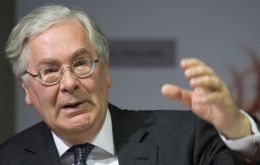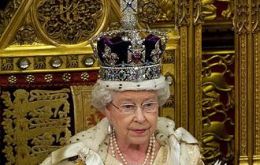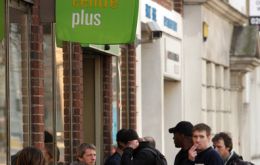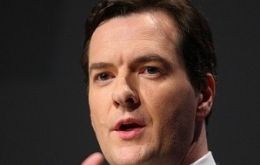MercoPress. South Atlantic News Agency
Tag: George Osborne
-
Wednesday, July 25th 2012 - 19:33 UTC
UK remains deep in recession: even the services sector contracted

Britain's economy shrank far more than expected in the second quarter, battered by everything from an extra public holiday to government spending cuts and the neighbouring Euro zone crisis.
-
Friday, June 8th 2012 - 20:51 UTC
Bank of England stand-by on optimism over a solution to the Euro debt crisis

The Bank of England has resisted injecting further emergency liquidity to the UK economy as optimism over finding a solution to the Euro zone debt crisis grew.
-
Friday, May 25th 2012 - 01:16 UTC
UK deeper in recession; IMF recommends more stimuli measures

Britain fell deeper into recession than initially thought in the first quarter of 2012 due to a slump in construction output, raising the likelihood that the Bank will opt to inject more stimuli to protect the economy from the Euro zone debt crisis.
-
Wednesday, May 9th 2012 - 18:32 UTC
The Queen addresses Parliament setting out government policy

Queen Elizabeth II gave her “Queen's Speech” to Britain's parliament Wednesday, setting out government policy for the coming year as the ruling coalition sought to fight back after a dismal month.
-
Thursday, March 15th 2012 - 00:28 UTC
UK youth unemployment at its highest in two decades: 22.5%

United Kingdom’s unemployment rate held at a 13-year high of 8.4% in the three months to January, and the youth unemployment rate rose to a record high, official data showed Wednesday.
-
Tuesday, December 20th 2011 - 22:43 UTC
Moody's praises UK management but warns of “formidable and rising challenges”

Ratings agency Moody's has given the UK high scores for economic governance but warns the country it faces “formidable and rising challenges”.
-
Wednesday, December 14th 2011 - 17:04 UTC
October marks UK highest unemployment level in 17 years

The number of Britons out of work rose to its highest level in more than 17 years in October, and these jobless figures look set to rise further as firms facing the threat of a renewed recession cut back on staff.
-
Thursday, December 8th 2011 - 20:19 UTC
UK NATO campaign in Libya (longer than expected) cost 333 million dollars

The UK contribution to the NATO operation in Libya cost £212 million pounds (333 million dollars), Defense Secretary Philip Hammond said on Thursday in London.
-
Thursday, October 6th 2011 - 16:59 UTC
Bank of England agrees to inject £ 75 billion to shield the British economy

The Bank of England will inject 75 billion pounds to shield Britain's economy from the Euro zone debt crisis and keep a faltering recovery going, opting for an early, dramatic move to maximise the impact.
-
Monday, October 3rd 2011 - 21:33 UTC
S&P tells UK to stick to plans to cut budget deficit if not credit ratings could be reviewed

Britain's prized triple-A sovereign debt rating could come under pressure if the government strays from its path of public deficit cuts in the face of weaker growth, credit agency Standard & Poor's said on Monday.
